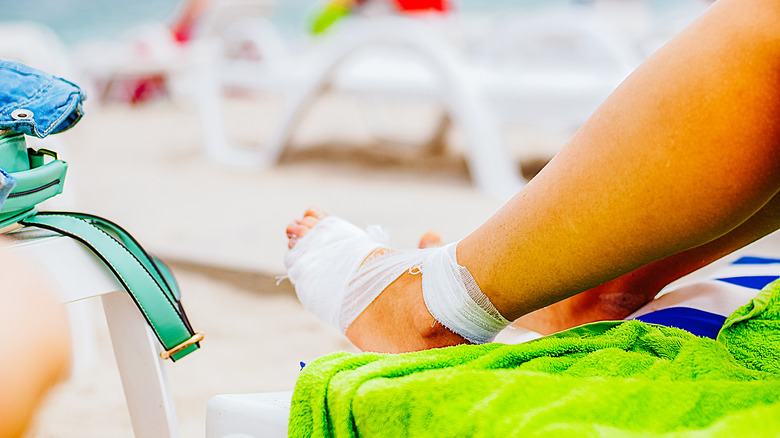Is Swimming In The Ocean With An Open Cut Safe?
People travel from all over the world to swim in the crystal-clear waters of the Caribbean — but is the water really as pristine as it appears? While in general, swimming in the ocean may be one of the cleanest options, it's still a part of nature. When you're looking down into the perfect blue waters along the coast anywhere on the planet, it can be easy to forget that the sea isn't exactly a sterile environment, and that if you have an open cut or wound, swimming in the ocean is a bad idea.
While you can usually move through the water without any potential pathogens getting into your body, it gets riskier when you have a cut. To find out more about why going for a swim might be more dangerous than it seems, Islands spoke to Dr. Jason Singh, chief medical officer of One Oak Medical Group. Dr. Singh explained to us exclusively that "it is important to understand the risks of swimming with open wounds. The ocean's microscopic life has various bacteria, fungus, and microorganisms that can access your body thru an open wound direct pathway."
What are the risks of swimming with an open wound?
Everyone knows that there are dangerous spots in the ocean that you may need to avoid, but when you have an open wound, any seawater can be potentially dangerous. If you already have a common infection in your cut or wound, getting in the ocean can transform that injury from a small problem to a major one. As Dr. Jason Singh shared exclusively with Islands, "Staphylococcal infections can get worse when exposed to seawater which potentially can lead to cellulitis or deeper tissue infections."
Even a perfectly clean wound is at risk in the sea, and there are a number of bacteria, fungi, and other pathogens floating around in the ocean that can be an issue for anyone with an open wound. You may be familiar with the risk of getting vibriosis from undercooked oysters, but Dr. Singh revealed that you can also get it from swimming in the ocean when you have an open cut. This kind of infection can be extremely painful, or even deadly — particularly for anyone who already has a compromised immune system.
What should you do if you get a cut while swimming in the ocean?
If you hit the beach without a scratch on you, there are still hidden dangers of ocean water, even when you're swimming in the turquoise Caribbean Sea, and it wouldn't be unheard of to find yourself with a cut once you're already in the water. Dr. Jason Singh warned that coral and pieces of shell can be very sharp, and cuts and scratches you might get from bumping into them or stepping on them can give you infections. If it happens to you, Dr. Singh told us exclusively the first thing you should do is to get out of the water to reduce the amount of time the cut has to become infected.
Once you're on dry land, Dr. Singh advises taking out any debris still stuck in the cut, washing the injury with clean water, and using an antiseptic like chlorhexidine or povidone-iodine. Then, apply pressure with a clean gauze to stop the bleeding, cover it with a waterproof bandage, and stay out of the ocean until it heals up. To make sure that the wound didn't get infected while you were in the water, Dr. Singh also suggests that you "monitor for signs of infection — increased redness, warmth, swelling, pus, fever, [and] chills."


